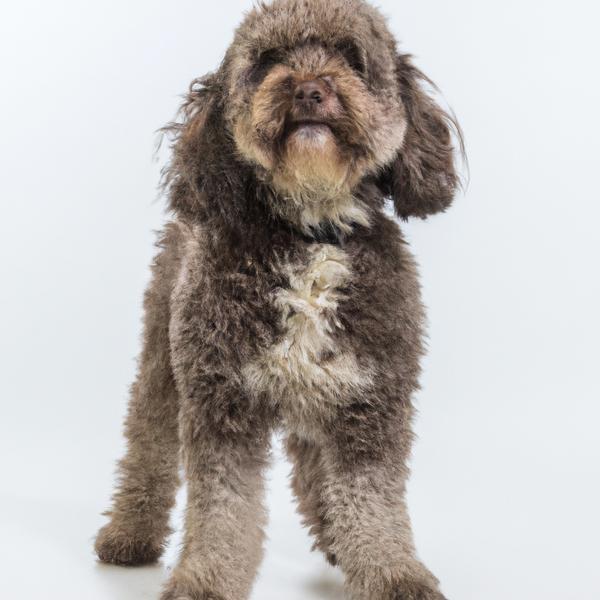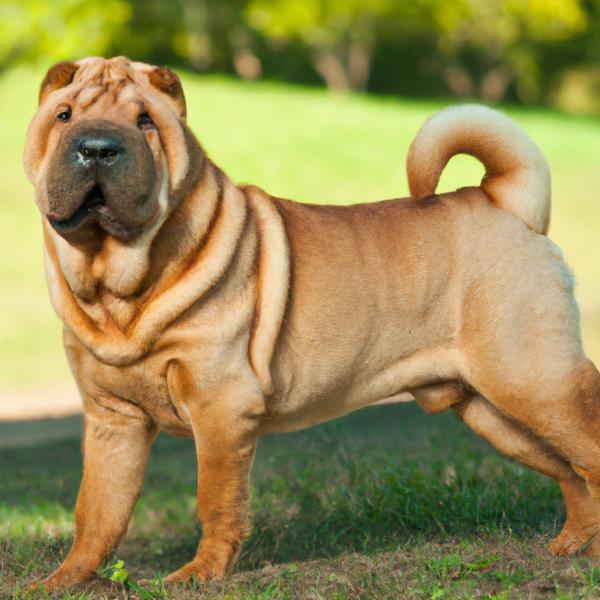Chesa-Poo vs Chinese Shar-Pei Comparison. Which dog is better for you: Chesa-Poo or Shar-Pei?
Compare the Chesa-Poo and Chinese Shar-Pei breeds to identify their similarities and differences. Are you trying to decide between a Chesa-Poo or a Shar-Pei? Read on to determine which breed is the better fit for you
Other names
Chesa-Poo
char pei, Shar-Pei
Weight
What is the average weight of Chesa-Poo and Chinese Shar-Pei?
20.0 pounds
( 9 kg )
52.5 pounds
( 24 kg )
Height
What is the average height of Chesa-Poo and Chinese Shar-Pei
14.5 inches
( 36.8 cm )
19.0 inches
( 48.3 cm )
Hypoallergenic
Are Chesa-Poos or Chinese Shar-Peis hypoallergenic, or neither?
No
Unfortunately, neither Chesa-Poo nor Chinese Shar-Pei are hypoallergenic, which may not make them the best choice for dog lovers who suffer from pet allergies.
Origin
What is the origin of Chesa-Poo and Chinese Shar-Pei dog breeds?
United States
China
Ancestry
What are the origins of Chesa-Poo and Chinese Shar-Pei breeds?
Poodle and Chesapeake Bay Retriever
Chow Chow
Date of Birth
When were Chesa-Poo and Chinese Shar-Pei breeds first developed?
Unknown
206 BC
Litter Size
What is the usual litter size for Chesa-Poo and Chinese Shar-Pei?
2-4 puppies per pregnancy
A Chesa-Poo can have a litter of 2-4 puppies on average. However, it's worth noting that the size of the litters can vary greatly. Factors that can influence litter size include the health of the mother, breeding history, and genetics.
8-12 puppies per pregnancy
A Chinese Shar-Pei can have a litter of 8-12 puppies on average. However, it's worth noting that the size of the litters can vary greatly. Factors that can influence litter size include the health of the mother, breeding history, and genetics.
Major Concerns
What are the major health concerns for Chesa-Poo and Chinese Shar-Pei breeds?
Entropion
Sebaceous Adenitis
Hip Dysplasia
Bloat
Sebaceous Adenitis
Hip Dysplasia
Bloat
Entropion
Hip Dysplasia
Kidney Problems
Chinese Shar-Pei Fever
Mast Cell Tumors
Hip Dysplasia
Kidney Problems
Chinese Shar-Pei Fever
Mast Cell Tumors
Minor Concerns
What minor health issues should be kept in mind when owning Chesa-Poo and Chinese Shar-Pei?
Cataracts
Retinal Dysplasia
Degenerative Myelopathy
Retinal Dysplasia
Degenerative Myelopathy
Patellar Luxation
Elbow Dysplasia
Demodectic Mange
Skin Problems
Heat Sensitivity
Elbow Dysplasia
Demodectic Mange
Skin Problems
Heat Sensitivity
Occasional Tests
What occasional tests are recommended for Chesa-Poo and Chinese Shar-Pei breeds?
Eye
Hip
Spine
Skeletal
Skin Scraping
X-Rays
Eye Examination
Hip
Spine
Skeletal
Skin Scraping
X-Rays
Eye Examination
Eye
Hip
Elbow
Blood
Knee
X-Rays
Physical Examination
Hip
Elbow
Blood
Knee
X-Rays
Physical Examination
Past times
What are some enjoyable activities and ways to keep Chesa-Poo and Chinese Shar-Pei entertained?
Fetch, Walk, Frisbee, Swimming, Chase, Tug-of-war
Napping, Exploring, Jogging, Walking, Cuddles, Sniffing, Fetch, Sleeping, Running, Going on walks, Chewing bones, Cuddling, Eating Snacks, Walk, Tug-of-war, Play, Walks
Grooming
Which breed is easier to maintain in terms of grooming, Chesa-Poos or Chinese Shar-Peis?
![]()
![]()
![]()
![]()
![]()
Chesa-Poos require significant grooming, including regular trims and professional grooming assistance to maintain their coat. They may also require frequent bathing to keep their coat and skin healthy.
![]()
![]()
![]()
![]()
![]()
The Chinese Shar-Pei has low grooming needs and is easy to maintain.
Dog Friendly
Which breed is more sociable with other dogs: Chesa-Poo or Chinese Shar-Pei?
![]()
![]()
![]()
![]()
![]()
Chesa-Poos are average in their friendliness towards other dogs, and socialization can help.
![]()
![]()
![]()
![]()
![]()
Chinese Shar-Peis are less friendly towards other dogs, but can improve with socialization.
Playfulness
Which breed is more playful between Chesa-Poo and Chinese Shar-Pei?
![]()
![]()
![]()
![]()
![]()
Chesa-Poo and Chinese Shar-Pei are playful dogs. So, no matter how busy the day may get, the best thing you can do for Chesa-Poo and Chinese Shar-Pei is to make time each day to play. It can be as little as 15-20 minutes, and it will mean the world to them.
Trainability
How do the trainability levels of Chesa-Poos and Chinese Shar-Peis compare?
![]()
![]()
![]()
![]()
![]()
Chesa-Poos are popular for their ease of training and quick learning ability.
![]()
![]()
![]()
![]()
![]()
Chinese Shar-Peis are usually easy to train but require consistency to fully obey commands.
Common match-ups
- Chinese Shar-Pei vs Bouvier des Flandres
- Coton de Tulear vs Irish Terrier
- Soft-Coated Wheaten Terrier vs American Staffordshire Terrier
- American Eskimo vs Weimaraner
- Berger Picard vs English Cocker Spaniel
- Pomeranian vs Saluki
- Skye Terrier vs Polish Lowland Sheepdog
- Belgian Laekenois vs Azawakh
- Miniature Bull Terrier vs German Wirehaired Pointer
- Scottish Deerhound vs Curly Coated Retriever

